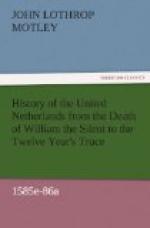There was little doubt on the subject in the minds of those engaged in this expedition. All felt most keenly the importance of the game, in which the Queen was staking her crown, and England its national existence.
“I pray God,” said Wilford, an officer much in Walsingham’s confidence, “that I live not to see this enterprise quail, and with it the utter subversion of religion throughout all Christendom. It may be I may be judged to be afraid of my own shadow. God grant it be so. But if her Majesty had not taken the helm in hand, and my Lord of Leicester sent over, this country had been gone ere this. . . . This war doth defend England. Who is he that will refuse to spend his life and living in it? If her Majesty consume twenty thousand men in the cause, the experimented men that will remain will double that strength to the realm.”
This same Wilford commanded a company in Ostend, and was employed by Leicester in examining the defences of that important place. He often sent information to the Secretary, “troubling him with the rude stile of a poor soldier, being driven to scribble in haste.” He reiterated, in more than one letter, the opinion, that twenty thousand men consumed in the war would be a saving in the end, and his own determination—although he had intended retiring from the military profession—to spend not only his life in the cause, but also the poor living that God had given him. “Her Highness hath now entered into it,” he said; “the fire is kindled; whosoever suffers it to go out, it will grow dangerous to that side. The whole state of religion is in question, and the realm of England also, if this action quail. God grant we never live to see that doleful day. Her Majesty hath such footing now in these parts, as I judge it impossible for the King to weary her out, if every man will put to the work his helping hand, whereby it may be lustily followed, and the war not suffered to cool. The freehold of England will be worth but little, if this action quail, and therefore I wish no subject to spare his purse towards it.”




